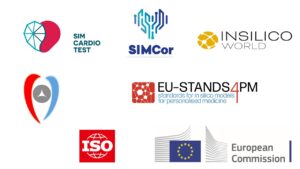SimCardioTest takes the mature field of cardiac simulations and brings it further through a web-based platform to perform standardised in-silico trials for testing the efficacy and safety of drugs and devices in 3 concrete use cases. The verification and uncertainty quant-ification, to abide by the standards, will allow to quantify discretisation error (in time and space), numerical solver error. Uncertainty in model predictions will be compared to actual measurement. And to extend the verification, validation will be implemented according to the ASME V&V 40 standards including risk eval-uation as well as certification support for in-silico trials.
To further discuss verification & validation processes for in-silico models, SimCardioTest organised a workshop on 8 February 2022 with the other EU funded projects: SimInSitu, SIMCor, InSilicoWorld & EU-stands4PM.

Hundred of participants attended the workshop to listen:
- Maxime Sermesant, from Inria, Coordinator of SimCardiotest, opened the workshop with a Welcome note & presentation of the SimCardioTest project.
- Romano Setzu, from Microport, on Verification & Validation of Modeling for MRI conditional safety.
A session, dedicated to the Coordinators of the different european projects, who presented their approaches in V&V. , was moderated by Liesbet Geris, Director of the VPHi. - InSilicoWorld and the Good Simulation Practice position paper, Marco Viceconti, Università di Bologna
- SIMCor: Validation Strategy for in-silico testing of medical devices based on virtual cohorts, Jan Brüning, Charité, Institute of Computer-assisted Cardiovascular Medicine
- SimInSitu – Challenges & Opportunities Implementing A Tiered Validation Approach, Nils Götzen, 4realsim
- EU-Stands4pm, ISO-Technical Specification for computational modelling approaches, Marc Kirshner, Forschungszentrum Jülich GmbH
- Standards for in-silico modeling in health research and medicine, Martin Golebiewski, HITS gGmbH – Heidelberg Institute for Theoretical Studies
